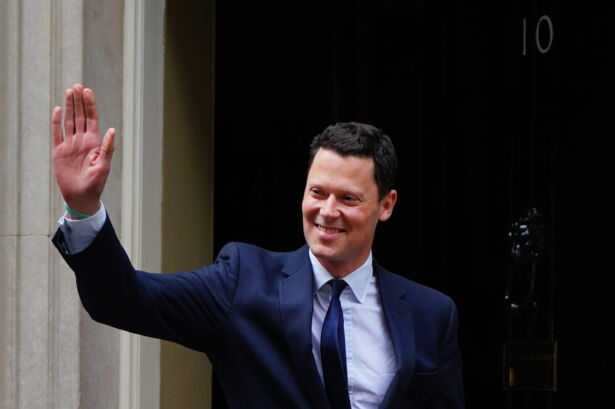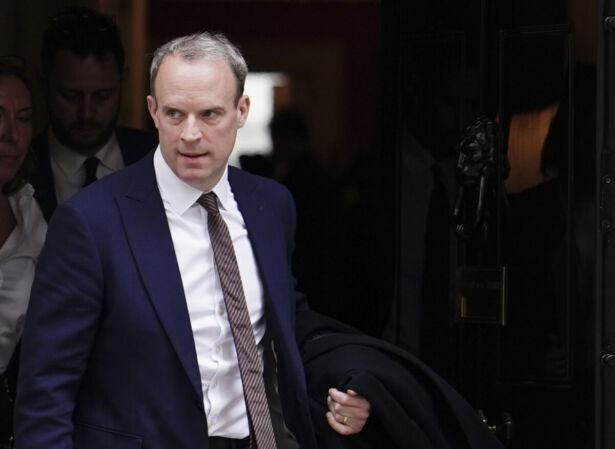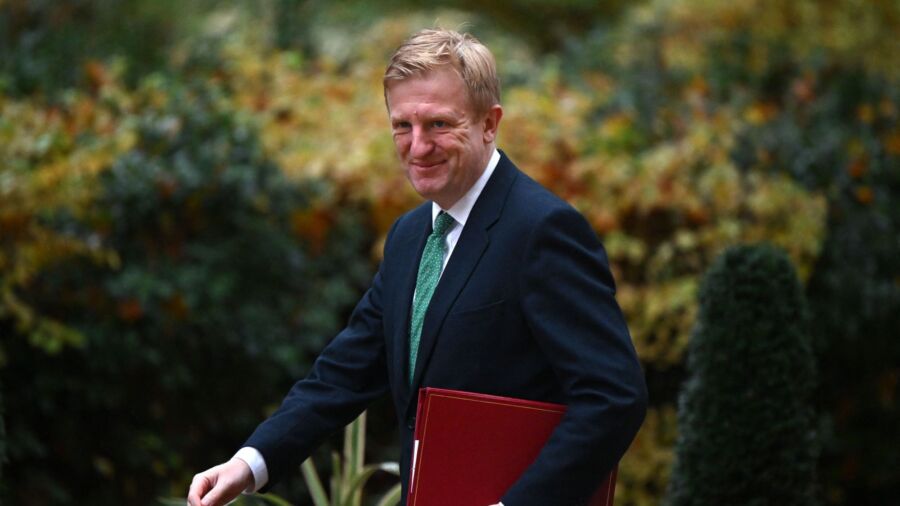Oliver Dowden has replaced Dominic Raab as deputy British prime minister on Friday after Raab resigned over bullying claims.
Downing Street also appointed defence procurement minister Alex Chalk as the new Lord Chancellor and secretary of state for justice—another role Raab has vacated.
Formerly a barrister, Chalk has been an MP since 2015 and previously served as HM solicitor-general for England and Wales and as the prisons and probation minister.
Also elected in 2015, Dowden was appointed as the culture secretary in 2020 and is currently the chancellor of the Duchy of Lancaster and the secretary of state in the Cabinet Office.
Downing Street also used the mini-reshuffle to announce that former Work and Pensions Secretary Chloe Smith will cover for Michelle Donelan when the science, innovation, and technology secretary is on her maternity leave.

Raab’s Resignation
Raab’s resignation came after an inquiry into bullying claims against him found that he had acted in an “intimidating” manner.
The former Cabinet minister said he felt “duty bound” to resign as he had promised to do so if the report “made any finding of bullying whatsoever,” but he claimed that the bar for bullying was set “so low” that it would set a “dangerous precedent for the conduct of good government.”
The inquiry, carried out by senior lawyer Adam Tolley KC, was requested by Raab and approved by Sunak after media reports that claimed the minister had been “very rude and aggressive” towards civil servants and that he had created a “culture of fear” at the Ministry of Justice (MOJ).
It examined a total of eight claims in relation to Raab’s behaviour as foreign Secretary, justice secretary, and Brexit Secretary.
The report (pdf) didn’t find evidence of bullying when Raab was the Brexit secretary.
Regarding the Foreign Office complaint, Tolley said Raab had acted in a way that was “intimidating, in the sense of unreasonably and persistently aggressive conduct in the context of a work meeting.”
“It also involved an abuse or misuse of power in a way that undermines or humiliates,” the report said.
According to Raab, who hit out at what he described as a “Kafkaesque saga” in an article published in The Telegraph, he “made changes to the personnel conducting the Brexit negotiations on Gibraltar with Spain, having found out a senior negotiator had gone beyond the democratic mandate set by Cabinet.” He said the change “involved no demotion or longer-term detriment” and was “essential to securing a deal with Spain” at the time.
But the report found that while the personnel change was “legitimate,” Raab mentioned “the Civil Service Code in a way which could reasonably have been understood as suggesting that those involved had acted in breach of the Civil Service Code,” which could be interpreted as a threat of dismissal.
It “was a form of intimidating behaviour, in the sense of conveying a threat of unspecified disciplinary action,” the report said.
It also said Raab didn’t target anyone or intend to threaten anyone, but should have realised that his mentioning of the Civil Service Code “could well have been understood as a threat.”

Regarding group complaints made by MOJ officials, the report said the former justice secretary had “acted in a manner which was intimidating” by making unconstructive critical comments on a number of occasions.
The examples cited showed that Raab complained about the lack of “basic information” in documents and “obstructiveness” on the part of officials whom he perceived to be resistant to his policies, and called some work as “utterly useless” and “woeful.”
The report said Raab didn’t intend to target anyone or to upset or humiliate, but the unconstructive criticisms, combined with a habit of interrupting people, “is likely to be experienced as intimidating, in the sense of being unreasonably difficult to deal with, and plainly was so experienced by some individuals.”
Raab: Bullying Threshold ‘So Low’
In his letter of resignation to Sunak, Raab said he’s “genuinely sorry for any unintended stress or offence” any officials felt “as a result of the pace, standards, and challenge” he brought to the MOJ, but argued that the inquiry has “set a dangerous precedent” by “setting the threshold for bullying so low,” saying it will “encourage spurious complaints against ministers, and have a chilling effect on those driving change.”
He also called on Sunak to order an independent review of “a number of improprieties that came to light during the course of this inquiry,” including the “systematic leaking of skewed and fabricated claims to the media in breach of the rules of the inquiry and the Civil Service Code of Conduct, and the coercive removal by a senior official of dedicated private secretaries” from his MOJ private office in October last year.
Prime Minister Rishi Sunak accepted Raab’s resignation, saying he was right to keep his promise, but it’s “clear that there have been shortcomings in the historic process that have negatively affected everyone involved.”
“We should learn from this how to better handle such matters in future,” he wrote in a letter to Raab.
Labour leader Sir Keir Starmer said the prime minister showed “double weakness” in his handling of the matter, by bring Raab back into the government after being allegedly warned about his behaviour and by not sacking Raab upon receiving the report.
Asked if Sunak regretted appointing Raab last year, the official spokesman for Downing Street said: “No. I think the report makes clear that the former secretary of state is highly intelligent, pays close attention to detail, seeks to make decisions based on evidence, has strong principles and is guided by them, and works assiduously. So, obviously, the prime minister stands by his decision.
“Clearly, this report has established a number of facts and the prime minister has come to a judgement,” he added.
Downing Street also rejected public service union FDA’s call for an independent inquiry into ministerial bullying.
But the spokesman said Sunak had asked the Cabinet Office to look at how ministers “can better learn to handle some of the issues that this report has raised, in terms of how concerns about working practices are raised in a timely manner and how they are dealt with.”
PA Media contributed to this report.
From The Epoch Times

